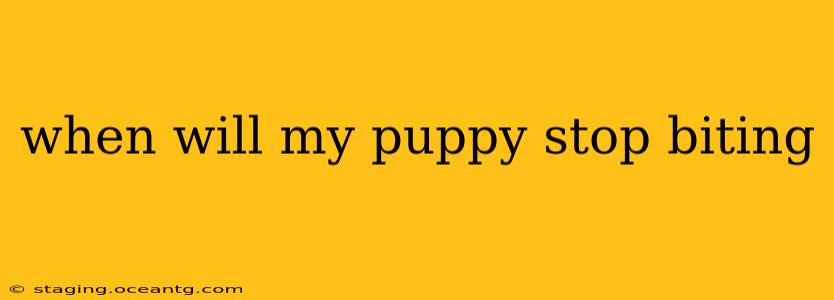Bringing home a new puppy is an exciting time, filled with playful cuddles and endless adorable moments. However, the reality of puppyhood often includes a lot of nipping and biting. This is a completely normal part of puppy development, but understanding the reasons behind it and knowing what to expect can help you navigate this phase more effectively. This guide will explore the typical timeline, reasons for biting, and most importantly, effective training strategies to curb this behavior.
Why Do Puppies Bite?
Puppies bite for a variety of reasons, and understanding these motivations is crucial for addressing the behavior. Many times, it's not malicious; it's simply how they explore the world and communicate.
- Teething: Like human babies, puppies go through teething. The discomfort and pressure in their gums can lead to biting as a way to relieve pain.
- Exploration: Puppies use their mouths to explore their surroundings, much like babies use their hands. Everything is a potential object of investigation – your fingers, your shoes, even the furniture.
- Play: Biting is often part of a puppy's play behavior, particularly when playing with littermates or other dogs. They learn bite inhibition through play.
- Attention-Seeking: If biting gets them a reaction (even a negative one), they may continue the behavior because it's eliciting a response.
- Fear or Anxiety: Some puppies bite out of fear or anxiety, particularly in unfamiliar situations or when feeling threatened.
How Long Does the Biting Phase Last?
There's no single answer to this question, as it varies significantly depending on the breed, individual puppy personality, and the effectiveness of training. However, most puppies significantly reduce their biting around 6-8 months old. Some may continue to mouth gently beyond this age, but the sharp, intense biting should decrease considerably.
What Can I Do to Stop My Puppy from Biting?
Consistent training and management are key to managing puppy biting. Here are some effective strategies:
1. Bite Inhibition Training:
- Yelp Method: When your puppy bites too hard, let out a high-pitched yelp, like a puppy would. This mimics the reaction of another puppy and usually surprises them, causing them to pause. Immediately remove yourself from the play session for a short period.
- Positive Reinforcement: Reward calm behavior with treats and praise. When your puppy is chewing appropriately on a toy, reward them generously.
- Toy Substitution: If your puppy starts biting you, redirect them to an appropriate chew toy.
2. Supervise Interactions:
- Constant Supervision: Never leave a young puppy unsupervised with children or vulnerable individuals. Always actively supervise playtime.
- Controlled Play Sessions: Keep play sessions short and end them before your puppy gets overtired and more prone to biting.
3. Provide Appropriate Chew Toys:
- Variety of Textures: Offer a variety of toys with different textures and materials to keep your puppy entertained.
- Frozen Kongs: Fill a Kong with frozen treats to provide a satisfying and long-lasting chew.
4. Manage Your Reactions:
- Avoid Punishing: Punishment is ineffective and can actually worsen the problem by creating fear and anxiety.
- Stay Calm: Maintain a calm demeanor even when your puppy is biting.
When Should I Seek Professional Help?
If your puppy's biting is excessive, aggressive, or doesn't improve with consistent training, seeking professional help from a veterinarian or certified professional dog trainer is crucial. They can assess the situation, rule out underlying medical issues, and develop a customized training plan.
People Also Ask:
How do I teach my puppy not to bite my hands?
This requires consistent application of bite inhibition techniques. When your puppy nips at your hands, immediately use the yelp method and substitute a toy. Reward gentle licking or sniffing of your hands. Never let your puppy bite your hands during play; consistently redirect them to appropriate toys.
My puppy bites when he's excited, what can I do?
Excited biting is often a sign of a lack of bite inhibition. Manage your puppy's excitement level by keeping play sessions short and controlled. When your puppy starts to get overly excited, take a break from the interaction.
At what age do puppies typically stop biting hard?
Most puppies significantly reduce their hard biting between 6 and 8 months old, although this can vary depending on breed, training, and individual temperament.
Is it normal for a puppy to bite aggressively?
While some nipping and biting is normal, aggressive biting is not. If your puppy bites aggressively, seek professional help from a veterinarian or certified dog trainer to determine the cause and develop an appropriate plan. Aggressive biting could indicate underlying issues that need addressing.
This guide provides a comprehensive overview of puppy biting. Remember, patience and consistency are vital in training your puppy. With proper training and management, your puppy will learn bite inhibition and become a well-adjusted companion.
